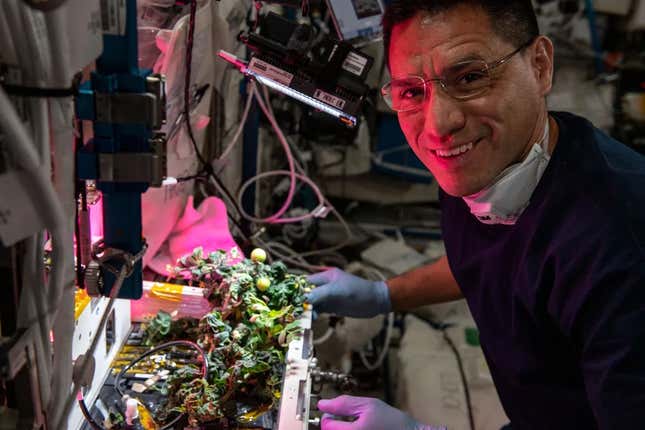For a year, a rogue tomato was missing in action on board the International Space Station (ISS), sparking rumors that an astronaut may have eaten it during a moment of weakness. It turns out that there were actually two missing tomatoes, not just one, found squished in a tiny ziplock bag, and they’re looking a little rough tbh.
NASA shared an update on the case of the missing tomatoes on Thursday, releasing a photo of the retrieved ziplock bag containing the “dehydrated and slightly squished” tomatoes that still have “no visible microbial or fungal growth,” the space agency wrote. Although a lot went into finding the tomatoes, they were thrown away and will not be coming home for analysis on Earth.
Advertisement
The tomatoes were a part of NASA’s Veg-05 experiment, a project focusing on growing fruits and vegetables in space. In 2022, NASA astronaut Frank Rubio harvested the tomatoes and put them in a little bag. “I was pretty confident that I velcroed it where I was supposed to velcro it and then I came back and it was gone,” Rubio said during a recent interview. “I spent probably 8 to 20 hours of my own time looking for that tomato. I wanted to find it mostly so I could prove that I did not eat the tomato.”
Advertisement

Advertisement
Rubio denied claims that he ate the tomato, but that didn’t stop his crew mates from playfully accusing him of enjoying a light snack while working on board the space station. The mystery was finally solved, however, when NASA astronaut Jasmin Moghbeli revealed during a livestream on December 6 that the tomato had finally been found. “Our good friend Frank Rubio, who headed home [on September 27], has been blamed for quite a while for eating the tomato. But we can exonerate him. We found the tomato,” Moghbeli said.
Rubio spent a record-breaking 371 days on board the ISS, and yet he still didn’t find the tomato during his long sting in low Earth orbit. “Hopefully somebody will find it someday, some little shriveled up thing in a ziplock bag,” Rubio said after returning home.
Advertisement
They certainly did, but the rogue tomatoes were immediately discarded, according to NASA. The Veg-05 experiment used the space station’s Veggie facility to grow dwarf tomatoes, studying the impact of light quality and fertilizer on the growth of fruit, its microbial food safety, nutritional value, and how it tastes.
For more spaceflight in your life, follow us on X (formerly Twitter) and bookmark Gizmodo’s dedicated Spaceflight page.
Services Marketplace – Listings, Bookings & Reviews